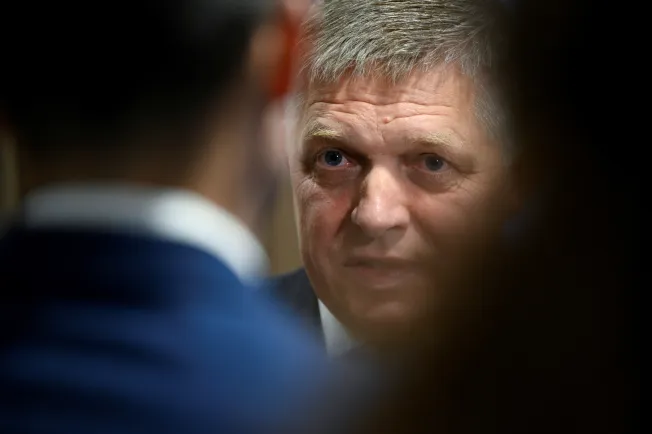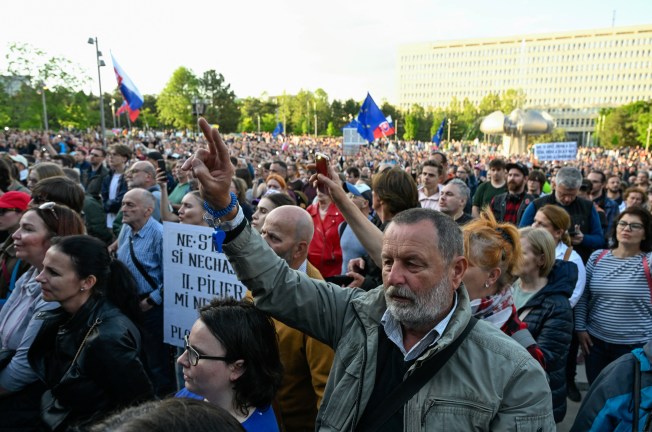The day after Slovak Prime Minister Robert Fico was shot on May 15, the heads of 27 news outlets condemned the attack and called on politicians not to further divide society by looking for culprits.
“Just like after the murder of our colleague Ján Kuciak and his fiancée Martina Kušnírová, we are once again at a crossroads,” they said in a joint statement, referencing the 2018 killing of Kuciak, likely in retaliation for his journalism on corruption. “This heinous act must not trigger further aggression, verbal attacks and revenge … We must all try to defuse the situation. Otherwise, tension and violence will escalate.”
In Slovakia, journalists have long endured verbal attacks and harassment from across the political spectrum, including under the pro-Western administration that ruled before Fico returned to power for the fourth time in October 2023.
But the editors’ May 16 warning seems to have fallen on deaf ears.
During CPJ’s latest visit to Slovakia, representatives met with journalists, press freedom advocates, and diplomats in the days surrounding the attack, who described the atmosphere as “depressing,” “toxic,” and “unprecedented.” Several said they saw the attempt on the prime minister’s life as a new chapter in the government’s war on the media.
On May 18, six newsrooms were threatened with arson in the comments section of a YouTube video by the far-right conspiracy theorist Daniel Bombic, who encouraged the threat, according to Mapping Media Freedom, a project of European press freedom organizations which tracks, monitors, and reacts to violations of press and media freedom in EU member states and candidate countries.
YouTube has since taken down the video and canceled Bombic’s channel for violating the platform’s guidelines.
Bombic, who lives in London, has a huge social media following and is wanted by Slovak authorities on extremism charges. He has hosted senior politicians on YouTube and uses his popular Telegram channel to harass and smear journalists.
CPJ was unable to find contact details to request comment from Bombic.
Since the May 15 attack, the police have worked with half a dozen newsrooms to bolster their security, a government official with knowledge of the situation told CPJ on condition of anonymity as they were not authorized to speak publicly.
Politicians make retaliatory threats against the media
Almost immediately after the attempted assassination, members of the ruling coalition blamed the attack on journalists by linking it to their critical coverage and issued retaliatory threats.

“This is your fault,” said Ľuboš Blaha, a deputy speaker of parliament and a member of Fico’s Smer party, who has used social media to accuse the press of bias and to smear journalists. “You, the liberal media, the political opposition, what hatred you spread against Robert Fico, you built the gallows for him,” he told reporters before the prime minister was discharged from hospital later in May.
Andrej Danko, leader of the nationalist SNS party, asked reporters, “Are you satisfied now?” and warned that a “political war” had begun and there would be “changes to the media.”
Journalists told CPJ they were not surprised by the vitriol. The environment for the press has taken a nosedive since the 2018 Kuciak murder, which triggered Slovakia’s biggest protests since the 1989 Velvet Revolution. The demonstrators called for an investigation into the journalist’s killing and an election, forcing the then-Prime Minister Fico to resign within weeks.
While in opposition, Fico ramped up his anti-media rhetoric against independent media, which he has long been openly aggressive towards given journalists’ exposure of multiple scandals within his party. Fico successfully used disinformation channels to win popularity by spreading COVID-19 conspiracies.
A 2023 study by the Bratislava-based think tank Globsec found that only 37% of Slovaks trusted the media, compared to 53% in neighboring Czech Republic — reflecting an environment that has been toxic for many years. Numerous politicians have benefited from attacking journalists, a populist call that resonates with a segment of the Slovak public.
In November, the prime minister described four leading outlets as “enemies” in a Facebook video and his office said that it would stop communicating with them because of their “hostile political attitudes.”
In his first video address since the attack, apparently recorded at home and posted on Facebook on June 5, Fico laid the blame for the attack on Slovakia’s liberal opposition, the “anti-government media” and foreign-funded NGOs for creating a climate of hatred and intolerance that made the shooting possible, the BBC reported. He said he did not believe the shooting was the act of “a lone lunatic,” without providing further details.
The day after the attempted assassination, 71-year-old Juraj Cintula was charged with attempted murder.The suspected assailant had a mixed past: he was a poet who founded a platform against violence, while also linked to an ultra-nationalist, pro-Russian paramilitary group. He had expressed criticism of Fico and said in a video filmed after his arrest that he disagreed with government’s policy towards the media.
Journalists fear draconian changes ahead
Journalists told CPJ that they feared politicians would use the attack on Fico as a pretext to push through draconian changes.
This month, parliament is expected to pass a law to abolish the public broadcaster Radio and Television of Slovakia (RTVS), which Fico has accused of bias, and give the government more control over its planned successor, Slovak Television and Radio (STVR). A senior Ministry of Culture official, Lukáš Machala — who has questioned whether the Earth is round and denounced the Investigative Center of Ján Kuciak, a journalism nonprofit founded after Kuciak’s killing, as a “plague” for investigating disinformation — has been named as a candidate to lead STVR.

Private TV stations are under pressure too.
TV Markíza, Slovakia’s biggest commercial broadcaster, is in turmoil after the host of its most popular debate show was sacked for airing his personal opinions. Michal Kovačič went off-script and spoke about the daily pressure from politicians and management to censor debates and a “creeping Orbánization” of the media.
“If we don’t stop it now, it will have devastating consequences for Slovak democracy,” Kovačič said, referring to Hungarian Prime Minister Viktor Orbán, an ally of Fico, whose right-wing government has systematically stifled Hungary’s media, including through forced closure, lawsuits, police harassment, and the use of spyware.
CPJ’s emailed request for comment to the Ministry of Culture, which is responsible for media regulation, did not receive a reply.
Increasingly hostile atmosphere for journalists
Even before the shooting, the atmosphere for the media was tense. Slovakia has become increasingly polarized following the victory of Fico’s Smer party in September’s parliamentary vote and April’s presidential election on a pro-Russian, anti-Western platform.
Tensions have risen with mass protests this year over government moves to take control of the public broadcaster RTVS and to close down a special anti-corruption prosecutor’s office that was in charge of the investigation into Kuciak’s murder, as well as pursuing cases involving Fico and his allies.
Journalists told CPJ that they were facing an “orchestrated pattern” of abuse, with politicians verbally attacking reporters in public and online, and their supporters then amplifying their messages on social media. Many felt that the aggressive political rhetoric was worse than before Kuciak’s murder and several expressed fears that such insults could easily escalate into physical violence once again.
Matúš Kostolný, editor-in-chief of the independent Dennik N daily, one of the four “unwelcome” outlets banned from government buildings, told CPJ that the atmosphere was now “more aggressive and more toxic” than after Kuciak’s 2018 murder and he had witnessed an uptick in hateful rhetoric targeting his staff in the last couple of months.
“We can see its impact in our email boxes and social media accounts,” he said.
In the first 100 days of 2024, the Investigative Center of Ján Kuciak recorded 20 online attacks against journalists. The center said that 11 of these incidents took place after politicians made negative comments about those individuals.
“Politicians not only fail to condemn these attacks on the media, but increasingly contribute to the hostile environment for journalists,” Lukáš Diko, the head of the center and a longtime journalist.
“We are not only targeted by politicians, but also by their supporters, both on social media and sometimes also in person. This is leading many to self-censor or to leave the profession.”
Women no longer feel safe working in the media
Women journalists have been particularly affected.
“I have learned many synonyms for prostitutes,” said Beata Balogová, editor-in-chief of daily SME newspaper, describing the surge in sexualized, aggressive hate speech she has received via social media and email in recent months.
“Female journalists have become more cautious,” the prominent veteran journalist told CPJ, referring to the decisions women now make about what stories are safe to publish and where they can go without fear of being verbally abused or attacked.
Her colleague, Zuzana Kovačič Hanzelová, announced in February that she was taking time out to “escape the hate” because she no longer felt safe walking down the street following the publication of her address and phone number and constant online smears.
“My boundaries of what is normal have shifted to the point that it feels like a normal Friday when people wish to rape me and would like to hang me,” she wrote in her farewell column in SME.
Justice remains elusive for Kuciak
The lack of justice for Kuciak has exacerbated the press’s insecurity.
On CPJ’s trip to Slovakia, representatives met Kuciak’s parents, Jozef and Jana Kuciak, at a memorial to their son in Bratislava’s historic Old Town, where passersby greeted the two, well known for their tireless fight against impunity for their 27-year-old son’s death.
“Keep it up,” one woman encouraged the couple.

Kuciak is widely believed to have been targeted in retaliation for his reporting on corruption for the news website Aktuality. His last story looked at transactions by firms linked to businessman Marián Kočner connected to a luxury apartment scandal.
Despite the conviction of four hitmen and intermediaries, Kočner has twice been found not guilty of masterminding the killings. The Supreme Court has yet to announce a date to hear the appeal against Kočner’s 2023 acquittal, filed by state prosecutors.
Jozef Kuciak also saw warning signs for an era of renewed violence in the prime minister’s shooting.
“I am horrified that something like this could happen again,” said Jozef Kuciak, who is retired but often travels with his wife from their remote village to meet with lawyers, journalists, activists, and politicians to lobby for justice.
He said he had hoped that his son’s death would remind Slovakians to shun violence, whatever their differences, because “human life is just so valuable and cannot be replaced.”
This content originally appeared on Committee to Protect Journalists and was authored by Attila Mong.
Attila Mong | Radio Free (2024-06-12T14:24:26+00:00) Hostile climate intensifies for Slovak press after PM Fico shooting. Retrieved from https://www.radiofree.org/2024/06/12/hostile-climate-intensifies-for-slovak-press-after-pm-fico-shooting/
Please log in to upload a file.
There are no updates yet.
Click the Upload button above to add an update.